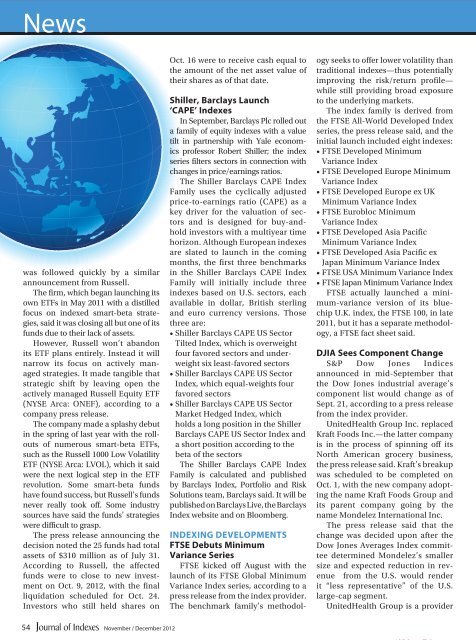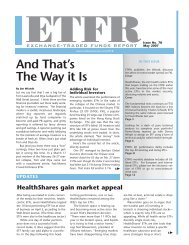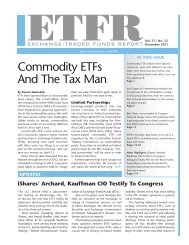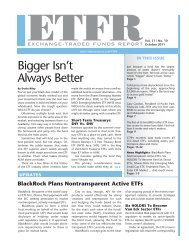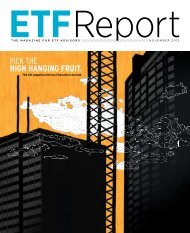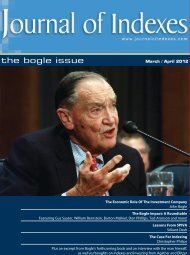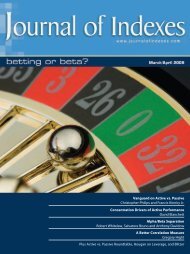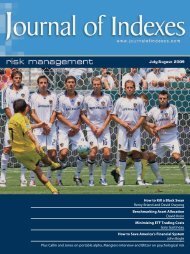Download complete issue - IndexUniverse.com
Download complete issue - IndexUniverse.com
Download complete issue - IndexUniverse.com
You also want an ePaper? Increase the reach of your titles
YUMPU automatically turns print PDFs into web optimized ePapers that Google loves.
News<br />
was followed quickly by a similar<br />
announcement from Russell.<br />
The firm, which began launching its<br />
own ETFs in May 2011 with a distilled<br />
focus on indexed smart-beta strategies,<br />
said it was closing all but one of its<br />
funds due to their lack of assets.<br />
However, Russell won’t abandon<br />
its ETF plans entirely. Instead it will<br />
narrow its focus on actively managed<br />
strategies. It made tangible that<br />
strategic shift by leaving open the<br />
actively managed Russell Equity ETF<br />
(NYSE Arca: ONEF), according to a<br />
<strong>com</strong>pany press release.<br />
The <strong>com</strong>pany made a splashy debut<br />
in the spring of last year with the rollouts<br />
of numerous smart-beta ETFs,<br />
such as the Russell 1000 Low Volatility<br />
ETF (NYSE Arca: LVOL), which it said<br />
were the next logical step in the ETF<br />
revolution. Some smart-beta funds<br />
have found success, but Russell’s funds<br />
never really took off. Some industry<br />
sources have said the funds’ strategies<br />
were difficult to grasp.<br />
The press release announcing the<br />
decision noted the 25 funds had total<br />
assets of $310 million as of July 31.<br />
According to Russell, the affected<br />
funds were to close to new investment<br />
on Oct. 9, 2012, with the final<br />
liquidation scheduled for Oct. 24.<br />
Investors who still held shares on<br />
Oct. 16 were to receive cash equal to<br />
the amount of the net asset value of<br />
their shares as of that date.<br />
Shiller, Barclays Launch<br />
‘CAPE’ Indexes<br />
In September, Barclays Plc rolled out<br />
a family of equity indexes with a value<br />
tilt in partnership with Yale economics<br />
professor Robert Shiller; the index<br />
series filters sectors in connection with<br />
changes in price/earnings ratios.<br />
The Shiller Barclays CAPE Index<br />
Family uses the cyclically adjusted<br />
price-to-earnings ratio (CAPE) as a<br />
key driver for the valuation of sectors<br />
and is designed for buy-andhold<br />
investors with a multiyear time<br />
horizon. Although European indexes<br />
are slated to launch in the <strong>com</strong>ing<br />
months, the first three benchmarks<br />
in the Shiller Barclays CAPE Index<br />
Family will initially include three<br />
indexes based on U.S. sectors, each<br />
available in dollar, British sterling<br />
and euro currency versions. Those<br />
three are:<br />
• Shiller Barclays CAPE US Sector<br />
Tilted Index, which is overweight<br />
four favored sectors and underweight<br />
six least-favored sectors<br />
• Shiller Barclays CAPE US Sector<br />
Index, which equal-weights four<br />
favored sectors<br />
• Shiller Barclays CAPE US Sector<br />
Market Hedged Index, which<br />
holds a long position in the Shiller<br />
Barclays CAPE US Sector Index and<br />
a short position according to the<br />
beta of the sectors<br />
The Shiller Barclays CAPE Index<br />
Family is calculated and published<br />
by Barclays Index, Portfolio and Risk<br />
Solutions team, Barclays said. It will be<br />
published on Barclays Live, the Barclays<br />
Index website and on Bloomberg.<br />
INDEXING DEVELOPMENTS<br />
FTSE Debuts Minimum<br />
Variance Series<br />
FTSE kicked off August with the<br />
launch of its FTSE Global Minimum<br />
Variance Index series, according to a<br />
press release from the index provider.<br />
The benchmark family’s methodology<br />
seeks to offer lower volatility than<br />
traditional indexes—thus potentially<br />
improving the risk/return profile—<br />
while still providing broad exposure<br />
to the underlying markets.<br />
The index family is derived from<br />
the FTSE All-World Developed Index<br />
series, the press release said, and the<br />
initial launch included eight indexes:<br />
• FTSE Developed Minimum<br />
Variance Index<br />
• FTSE Developed Europe Minimum<br />
Variance Index<br />
• FTSE Developed Europe ex UK<br />
Minimum Variance Index<br />
• FTSE Eurobloc Minimum<br />
Variance Index<br />
• FTSE Developed Asia Pacific<br />
Minimum Variance Index<br />
• FTSE Developed Asia Pacific ex<br />
Japan Minimum Variance Index<br />
• FTSE USA Minimum Variance Index<br />
• FTSE Japan Minimum Variance Index<br />
FTSE actually launched a minimum-variance<br />
version of its bluechip<br />
U.K. index, the FTSE 100, in late<br />
2011, but it has a separate methodology,<br />
a FTSE fact sheet said.<br />
DJIA Sees Component Change<br />
S&P Dow Jones Indices<br />
announced in mid-September that<br />
the Dow Jones industrial average’s<br />
<strong>com</strong>ponent list would change as of<br />
Sept. 21, according to a press release<br />
from the index provider.<br />
UnitedHealth Group Inc. replaced<br />
Kraft Foods Inc.—the latter <strong>com</strong>pany<br />
is in the process of spinning off its<br />
North American grocery business,<br />
the press release said. Kraft’s breakup<br />
was scheduled to be <strong><strong>com</strong>plete</strong>d on<br />
Oct. 1, with the new <strong>com</strong>pany adopting<br />
the name Kraft Foods Group and<br />
its parent <strong>com</strong>pany going by the<br />
name Mondelez International Inc.<br />
The press release said that the<br />
change was decided upon after the<br />
Dow Jones Averages Index <strong>com</strong>mittee<br />
determined Mondelez’s smaller<br />
size and expected reduction in revenue<br />
from the U.S. would render<br />
it “less representative” of the U.S.<br />
large-cap segment.<br />
UnitedHealth Group is a provider<br />
54<br />
November / December 2012


